|
July, 2005
Aug. 2005
Sept. 2005
Oct. 2005
Nov. 2005
Dec. 2005
Jan. 2006
Feb. 2006
Mar. 2006
Apr. 2006
May 2006
June 2006
July 2006
August 2006
September 2006
October 2006
November 2006
December 2006
January 2007
February 2007
March 2007
April 2007
May 2007
June 2007
July 2007
August 2007
September 2007
October 2007
November 2007
December 2007
February 2008
March 2008
April 2008
May 2008
June 2008
July 2008
August 2008
September 2008
October 2008
November 2008
December 2008
February 2009
March 2009
April 2009
May 2009
July 2009
August 2009
September 2009
November 2009
December 2009
January 2010
February 2010
March 2010
April 2010
May 2010
June 2010
July 2010
September 2010
October 2010
November 2010
December 2010
January 2011
February 2011
March 2011
April 2011
May 2011
June 2011
July 2011
September 2011
October 2011
December 2011
February 2012
April 2012
June 2012
July 2012
August 2012
October 2012
November 2012
February 2013
May 2013
July 2013
August 2013
ČERVENÁ BARVA PRESS NEWSLETTER
Gloria Mindock, Editor Issue No. 83 October, 2013
INDEX
Welcome to the October, 2013 Newsletter
New England Poetry Club presents
A SALUTE TO POET, NOVELIST, TRANSLATOR FRANKLIN D. REEVE
Sunday, October 20, 3 p.m.
with poets, translators, family reading tributes and from his work
X.J. KENNEDY
DIANA DER-HOVANESSIAN
GLORIA MINDOCK
WILLIAM LEO COAKLEY
LAURA STEVENSON
Cambridge Main Library 449 Broadway
Parking on street and basement garage
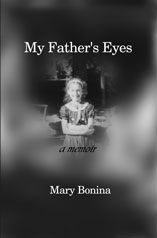

On Thursday, October 3rd, Cervena Barva Press launched "My Father's Eyes" (memoir)
by Mary Bonina at Porter Square Books. What a wonderful evening and 100 people attended and
so many bought books. We actually sold out of books at this launch. Thank you so much for
your support of this new book and of the press.
Interviewed this month: Andrei Guruianu
Book reviewed this month: "Company of Women: New and Selected Poems" by Ralph Pennel
There was no newsletter in September. Bill and I concentrated on getting books
ready for publication since we are behind schedule.
What we published so far in 2013:
My Father's Eyes (Memoir) by Mary Bonina
My Life With Blondie (Novel) by Jiri Klobouk
Hyperlinks of Anxiety (Poetry) by Daniel Y. Harris
Sweet Snow (Novel) by Alexander J. Motyl
The Bonsai Curator (Poetry) by Pamela L. Laskin
The next three books to be published in 2013 are by: Susan Lewis,
Denise Bergman, Rodica Draghincescu
(There will probably be a few more which will be announced next month)
Chapbooks
Except For That (Poetry) by Rachel Goldstein
Dead Letters (Poetry) by JP Reese
This is Not a Situation in Which You Should Remain Calm (Poetry) by Michelle Reale
Refuge in the Shadows (Poetry) by Krikor Der Hohanessian
Imaginary Planet (Poetry) by Alan Elyshevitz
Microtones (Poetry) by Robert Vaughan
amores Gitano/gypsy loves (Poetry) by Roberto Carlos Garcia
Chapbooks forthcoming in 2013 by Michael Estabrook, Tim Suermondt,
Bill Yarrow
and more…(to be announced next month)
Readings in our Cervena Barva Press Studio for the rest of October are as follows:
Readers:
October 17th: Richard Hoffman, Ben Mazer, and Ellen Jane Powers
October 18th: Mary Buchinger, Lawrence Kessenich, and Martin Willitts Jr.
October 22nd: Timothy Gager, Teisha Twomey, TBA
October 30th: Pamela Annas, Jesse Diamond, and Jen Grassl
Cervena Barva Press Reads Around the World:
I want to thank all my authors who are taking part in readings and have done the work to schedule and
host authors in their area. You are the best! It is wonderful because I could not do this without you!
I don't know the areas, bookstores or places that hold readings where many of you are. When I sent an
e-mail around to all of my authors, past, present, and future, the ones taking part are the ones that
responded to me. So thank you a zillion times. I am floored by all the kindness and I
wish I could come to all the readings! A few of you reported that you did not get the e-mail about
this. I sent one to everyone.
CERVENA BARVA PRESS READS ALL OVER THE WORLD IN OCTOBER
CERVENA BARVA PRESS reads in Chicago, IL
Next Door Chicago
"SWEET & SOUR POETRY HOUR"
Friday, October 18, 6:45PM
659 W Diveresey Parkway
Readers:
Bill Yarrow: "Incompetent Translations and Inept Haiku" forthcoming
Stella Vinitchi Radulescu: "Some Words suicidal" forthcoming
Joani Reese: "Dead Letters"
Host: Angela Oliver
CERVENA BARVA PRESS READS ALL OVER THE WORLD
October 24th, 7:00PM
Bookshop West Portal
80 W Portal Ave.
San Francisco, CA
Readers and Books Published by Cervena Barva Press
Lucy Lang Day: "God of the Jellyfish" and "The Curvature of Blue"
Richard Levine: Friend to Cervena Barva Press
Joan Gelfand: "Here and Abroad"
Daniel Y. Harris: "Hyperlinks of Anxiety" and "Paul Celan
and the Messiah's Broken Levered Tongue: An Exponential Dyad" (with Adam Shechter)
Reception to follow
Cervena Barva Press Reads All Over the World - NYC!
Thursday, October 24, 6:30-8:30PM
Sidewalk Bar and Restaurant
Corner of Avenue A & 6th Street
www.sidewalkny.com
Readers and Cervena Barva Press Books Published or Forthcoming by the Readers:
Susan Lewis: "how to be another" forthcoming
George Held: "W is for War," "the News Today," and "After Shakespeare: Selected Sonnets"
Roger W. Hecht: "Talking Pictures"
Susan Tepper: "Blue Edge" and "What May Have Been: Letters of Jackson Pollack & Dori G."
Alan Elyshevitz: "Imaginary Planet"
Ateet Tuli: "Posture"
Adam Shechter: "Paul Celan and the Messiah's Broken Levered Tongue: An Exponential Dyad"
Roger Sedarat: "From Tehran to Texas"
Larissa Shmailo: "A Cure for Suicide"
Claudia Serea: To Part is to Die Alittle" forthcoming
Roberto Garcia: "amores gitano"
Sami Shalom Chetrit: "Jews: Poems, Translations from Hebrew 1982-2013
Andrei Guruianu: "Interrogating Aesthetics" forthcoming
Martin Golan: e-books, stories: "Streets of Flowers" and "When Annie Fell off the Mountain"
William James Austin: Postcard Series One
Please check our readings page for more Cervena Barva Press readings and more readings
all over the country. Don't see your reading, send it to me.
The Raves section will be in the November and January newsletters. I have quite a few books to mention. I decided to have a Raves section every other month now rather than every month. So many books came out this fall from writers I know. It is so exciting!!!!
Congratulations to all of you!!!!
See you in November!

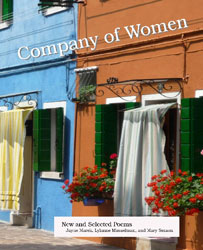
The primary task of anyone involved in a collaborative project is twofold. The first objective is to present
the contributors' efforts as a unified voice, or to cull from the work itself a unified objective or theme.
The second objective is to make sure the first objective not only does not subvert the very voices it seeks
to unify, but that it simultaneously serves to celebrate their uniqueness, as well. Company of Women, a
collection of poetry by Jayne Marek, Lylanne Musselman, and Mary Sexton published by Chatter House Press,
meets both objectives through thoughtful exploration of loss and retrieval, through quiet rumination and
triumphal exaltation, and through close examination of the interior from both near and far.
"Trapping Season," written by Jane Marek, and the very first piece of the book, inducts the reader into
the proper mindfulness. The piece is not only an exploration of traditional gender roles, but it is also
an exploration of consciousness and connectedness of the two concerns. The speaker, a young girl, is allowed
to watch her grandfather skin the muskrats he had trapped by the creek:
and one by one
he chopped off their head, the paws
like needles bundled in black velvet,
then sank the blade into the secret, the smell,
making crossings through the pale
belly, and slit at the tail. (3)
She is both complicit abettor and unwitting inheritor, and she both loses and gains something by
witnessing: by witnessing, she is exploring and exploiting the sacred, permeating the barrier between
the sexes, plumbing "male" consciousness "while the floorboards above us groaned / under the feet of
the women / in the kitchen, and the lantern light / wavered over the skinning and the stairs" (4). And,
despite descending into the subterranean in order to lose the self, it is through the ritual of skinning
and dismembering of the muskrat that she is able to transcend traditional gender roles.
In section two, Musselman continues this close examination of the interior, of the themes of loss and
retrieval through quiet rumination. In the poem "In My First Fifty Years" the speaker constructs the
narrative of her life, a careful disquisition of public and private events that are generationally and
culturally definitive, including the death of Lee Harvey Oswald.
The piece ends in a moment of exaltation, of rejuvenation, the very moment when the artist confronts
immortal creation and submits to its willful determination.
I have seen my stretched skin marked by the drum
of the womb.
I have seen people shuttered
by an image.
I have seen a dying page
breathe on its own. (40)
The final poet in the collection, Mary Sexson, carries the mantel through section three. The section is
titled, "Memories of an Unarchived Past," which gives the section not only its emotional dimensions, but
reinvests us to our original concerns of how a body of collected work fits together.
The section comes to an end with the author's reflection on the exterior as manifestation of the interior.
We find the speaker of the poem in the act of collecting the morning paper, baptized in early January light
of day, "Morning light that lingers over / the rooftops of the houses" (89). A moment of quiet, spiritual
reinvestment into the self that once again puts us face-to-face with the unnamable, one revelatory moment
at a time, as we are "seeking news of the world" (89).
Company of Women confronts the issues of cohesion head on. Each author's contribution gives and takes shape
in conjunction with the others'. The voices here are both brick and mortar. Forest and trees. And good company,
all the while.

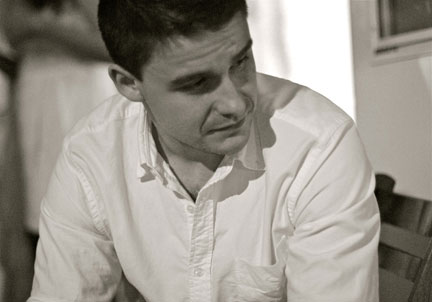
Andrei Guruianu was born on November 19, 1979 in Bucharest, Romania. He immigrated to the United States in 1991
and settled in Queens, NY, after which he studied at Binghamton University, Iona College, and Elmira College,
eventually earning a doctorate in English and creative writing from Binghamton University.
Before entering academia, for many years Guruianu worked as a newspaper reporter and columnist for the Press & Sun-Bulletin
in Binghamton, NY, as a cook and an electrician's apprentice, and had a few stints in retail. Guruianu also worked
as a literary magazine and small press editor and publisher, and from 2009 to 2011 served as Broome County, NY's
first poet laureate. He has received grants from the Broome County Arts Council and the Chenango County Council
on the Arts, and collaborated over the years on numerous arts projects with members of the community and
fellow writers and artists.
Guruianu's work has been published in numerous literary journals and magazines around the world, both in
print and online. He has been nominated three times for the Pushcart Prize and his poetry has been featured
by former U.S. Poet Laureate Ted Kooser in his column American Life in Poetry, He currently lives in New York City
where he teaches in the Expository Writing Program at New York University.
www.andreiguruianu.com
The Museum of Brief Sentiments, Vo. 1 & 2 (Kattywompus Press, 2013) are so beautifully designed and
written. Please discuss this double volume collection.
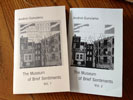
Somewhere in my library I have a book of poems by Pablo Neruda and on the cover is Neruda holding what
looks like a parcel wrapped in newspaper and twine. I love his poetry and I love that cover, especially
for that package that feels so nostalgic to me. If I were holding it I am sure I would love the feel of
it, the weight of the contents pulling at the string holding it together. And I would want to know what's
inside, to undo the knot and peel away the newspaper.
That image was what drove me to want to recreate that feeling of holding such a package and opening it.
And I wanted to do that with books, with my own work. We all love receiving packages in the mail and have
a sense of excitement and giddiness while opening them, anxious to see exactly what's inside.
More than a year ago now I was lucky to connect with Sammy Greenspan, editor at Kattywompus Press,
who's been incredibly supportive of my crazy ideas. Together we worked on putting out a new limited
edition collection titled The Museum of Brief Sentiments. It is a double volume chapbook consisting
of one book of lyrical poems as Volume 1 and one book-length poem as Volume 2. I knew I wanted to do
something special with these books and Sammy gave me the support I needed to make it happen.
Along with the books, we also included numbered and signed prints by the photographer
Teknari (www.teknari.com). I feel that the images speak beautifully to the content of the poems and
their inclusion adds both to the overarching narrative and contribute to the special feeling of the set.
In addition, each of the sets is hand numbered and signed (1-100). The best part: each set comes wrapped
by me in brown paper and tied with twine. It is my hope that when someone receives this package in the
mail they might experience something a little different, something a bit special. That those few seconds
it takes to hold it in hand and then unwrap the shell will create a relationship with the books and a sense
of curiosity about its contents. At least that is the hope.
The short story collection Body of Work was also recently released by Fomite Press. Give us a peek
inside this book and discuss some of the stories.
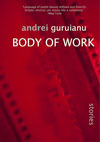
Body of Work is my first all fiction publication consisting of 13 short stories that have been in the works
for the past six years. I suppose it's taken me longer than most other collections to finish because initially
I did not consider myself a prose writer. My first foray into creative writing was poetry and I only came to
prose second, almost as an experiment. That said, there is a good chance that I am headed more in that
direction as a writer now, hoping to work on a novel in the near future.
I think the back cover description of Body of Work serves nicely as an introduction to the book: Throughout
thirteen stories, Body of Work chronicles the physical and emotional toll of characters consumed by the
all-too-human need for a connection. Their world is achingly common - beauty and regret, obsession and
self-doubt, the seductive charm of loneliness. Often fragmented, whimsical, always on the verge of
melancholy, the collection is a sepia-toned portrait of nostalgia - each story like an artifact of our
impermanence, an embrace of all that we have lost, of all that we might lose and love again someday.
The characters in this collection are as different as they come - a washed up painter, a migrant worker,
a child in foster care, an OCD insomniac. However, if there is one thing that links the characters in these
stories it's the fact that they came close, they almost made it, whatever it might have been that they were
after individually. I am fascinated by the lengths people go to in order to achieve something, to say that
they've reached a kind of personal success. As a society we're fascinated by success stories, achievements,
that final product that points to our sense of worth. And yet much of those efforts eventually leave us empty
and unfulfilled. How much happier the man or woman who finds solace and freedom in pursuit of the ordinary,
the common - what we might ultimately call our shared humanity.
Other books include "Postmodern Dogma," "and nothing was sacred anymore," "Front Porch World View,"
"Days when I Saw the Horizon Bleed," "Metal & Plum: A Memoir," "Anamnesis," "Exile," "It was Like that Once,"
and "How We are Now." Your list of books published is impressive. Please discuss a few of these.
I started my writing career as a newspaper reporter in upstate New York. But in retrospect it was always a
back-up plan. After giving up on a pre-med program, I graduated Binghamton University with an undergraduate
degree in English, which really did not leave me with many options. So I started doing what I happened to be
good at - putting words down on paper. The newspaper paid me for it so it felt like a good fit at the time.
But it didn't last and I moved back slowly towards academia. During that time working as a newspaper reporting
and planning a career teaching what I love I also started writing poetry on the side. And once I started the
floodgates opened as they say. The poems came easily at first, much informed by my experience as an immigrant
to America, and those poems indeed make up the bulk of my first two collections (and nothing was scared anymore
and Days When I Saw the Horizon Bleed).
The memoir, Metal and Plum (Mayapple Press), happened to be my doctoral dissertation at Binghamton University,
yet again a tribute to my background as a Romanian immigrant trying to come to terms with his life in Romania
during the 1980s and then as a teenager growing up in Queens, NY.
How We Are Now (Split Oak Press) is a short yet fun collection I worked on together with artist John Brunelli.
It consists of a series of photographs taken by John around the Binghamton, NY area and poems that I wrote
reflecting on those images. It was our goal to create a photo-poetic record of Binghamton in 2009, a kind of
statement saying, "this is what it was like" for future generations. I especially enjoy working on projects
such as these with other artists because both parties end up feeding off the creative energy and the result
is often unexpected and more spontaneous, something I tend to value in the arts.
You immigrated from Bucharest, Romania to the USA in 1991. When did you begin writing?
I did not begin writing "seriously" until about 2004-2005, so relatively recently. As a young student in
America I was expected to study math and the sciences in the hopes that I might become a doctor - the clichéd
American dream of many immigrants. While I had success in the subjects throughout high school, my heart was not
into it. In college I gravitated towards the liberal arts, studying poetry, literature, and philosophy.
It was both an end and a beginning.
From 2009-2011, you served as Broome County-NY's first poet laureate. What was this experience like?
Being Broome County Poet Laureate was not only a great honor but easily one of the most important experiences
for me as a writer. In my role as the county's poet laureate I was expected to help promote the literary arts,
which I did through free writing workshops and readings that were open to members of the community. I noticed
that there was a need for it in the community and the response was very positive. I was able to run a yearly
literary festival, publish a collection of works by members that attended the workshops, and also get a small
literary journal off the ground.
It also helped to keep me grounded in a sense, to remember that poetry and good writing has humble beginnings.
To be among a group of people who are there with you in the same room just writing for the sake of writing
without pretense or the dream of future publication is a good thing for all writers to experience every now and
then. We all started that way - with a love for words, for stories, for sharing what we've experienced. Yet
sometimes we lose perspective of these things as careers get in the way, as awards entice us with their glory,
as the prospect of a book dwarfs the excitement of a single word that gets it just right. The years when I was
poet laureate I got to experience all of those things and share them with others that had been there for me
throughout the whole process, my growth as a writer if you will. For what they gave to me in terms of support
I am extremely grateful. And if I was able to give something small back to them by what I did then it was all
worth it.
You currently teach Expository Writing at New York University. Talk about what you try to teach your students
about writing.
I can say without a doubt that my experience at NYU over the past two years has been one of the most important
in my teaching career. If there is one thing that I hope my students take away from our time together
(and this can apply to anyone else as well, I believe) is that to be a good writer you must be a good reader.
And you must read widely and with an open mind, allowing for those moments of uncertainty, of not knowing.
Without reading and without the ability to make sense of moments that trouble our understanding of the world
around us we remain stuck in a world of inherited beliefs, a world that necessarily limits one's ability to
express complex (and possibly conflicting) ideas in writing.
Discuss leaving Romania after the fall of Ceausescu. Was it a difficult transition moving to the United States?
For a 10-year-old immigration is scary, confusing, filled with uncertainty. We left all relatives behind in Romania
as well as all of my friends. I did not speak a drop of English. I always joke that I learned English by watching
American cartoons, but it's pretty close to the truth. Since we arrived in the spring I was not able to start school
until the following school year, so I had more than six months on my hands with nothing to do. Without friends,
without knowing my way around, and without the ability to communicate, all that I had left was the house we lived
in and the television. By the time I entered sixth grade in America I could already communicate easily and by the
end of the year I was fluent in the language, even earning me the title of salutatorian of my class. So I guess you
could say I was lucky to be a quick learner, which made my transition to the U.S. a bit easier.
When you started writing, did your early life under Ceausescu's rule ever come into your poems and stories?
I think it was inevitable that it would creep into my writing. Language, and therefore writing, is what we have
to make sense of the world around us. Being thrown into a chaotic new life I had to navigate between worlds and
languages and try to understand what was happening. It was also not easy knowing that the rest of our family
remained behind, that we might never return, that the future was precarious at best. What I began writing all
of those emotions and thoughts rose to the surface and, as I mentioned, the first two books I wrote dealt very
much with my early childhood experiences almost as a way to make sense of what I had been through. They are,
therefore, my two most autobiographical poetry collections (aside from the memoir). As I started to exhaust those
years, as time necessarily put distance between then and now and me and my early childhood, my own work started
changing, grappling with new subject matter.
What are you working on now?
I am currently working on a two-part (roughly 150 pages) prose poetry collection. Its aim is to address through
historical and contemporary references such topics as the limitations of memory, the transience of human life,
and the futility of history; above all, the difficulties of making art and meaning in a spiritually and
culturally bankrupt civilization.
The collection is divided into two parts titled At the Feet of Statues (implying that part of history that
is already written) and Unwritten Stone (that sliver of hope we retain for the future). Collectively, the
poems form meditations on the beauty of the banal, the endurance of the ephemeral, and the dangerous seductions
of history and myth, ultimately laying bare the human condition, past and present, but also where we might be
headed.
Describe your favorite place to write.
Haha. Wherever I can. I would say wherever there is peace and quiet but that is not always the case. I find
myself working quite well in coffee shops as a matter of fact. Something about the buzz and hum of the activity
around me - it eventually turns into something like white noise, which is very conducive to writing. And when you
need a bit of inspiration all you need to do is tune in to the conversation around you, some snippets of overheard
talk or an interesting outfit, and that is almost always enough to help you press on.
Before moving to NYC, you lived in Naperville, IL. Why the move? I guess flat land wasn't for you? Ha-Ha!
What was your experience in the Midwest like for you?
I think I'm harder on the Midwest that I need to be. I know it's a beautiful place and for some it is their
own emotional center. For me it just didn't fit. I am very much connected to the land and to place, and that
informs who I am as a person and therefore as an artist. For some reason in the Midwest I could not connect to
"place" - it did not feel like I could be one with the land, if I am allowed that cliché. I really do feel an
emotional connection to a place, as I think many people do, and it was lacking there. Therefore making the
decision to move back to the northeast is less a commentary on the Midwest itself but my own need to be in a
place where I felt connected.
Does anywhere in the USA remind you of Romania?
I suppose it would have to be the northeast, specifically upstate New York, the hills and the farms, a more
rural kind of life. It forms a kind of center for me, even though I know there are many things that could be
improved in those areas. But I suppose that's what makes it feel more like "home", or like the home I left
behind in Romania. It's a bit rough around the edges, much can be done to make it better, but in the end it
is one of the most beautiful places on earth for me. Just one look at the hills alive with autumn's colors
is enough to make you into a believer.
Talk about your book forthcoming by Cervena Barva Press.
Interrogating Aesthetics consists of prose-poem vignettes that are purposefully untitled and "out of context."
By this I mean that they often avoid overt determining references that could place them in a specific time and
place. When they do use such markers, they are spare and subtle. By placing the language and sentiments of the
poems outside a definitive context but within a discerning reader's own larger cultural framework, the book
offers a tool for contemplation, for discourse, for thinking through what matters. The short vignettes approach
the philosophical, historical, and aesthetic, and many verge on the aphoristic and epigrammatical.
What I was hoping to achieve is the point where as writers and readers we might engage on the level of the
universal symbol, something that travels across specific time and culture. It is my belief that to achieve this,
at least in my interpretation of the aesthetic act as it manifests itself in this collection, I had to focus on
sentiment only. Sure, specifics might change over time and place, but universal sentiments
(love, anger, hatred, etc.) remain the same. The objects, characters, and places in a poem then became mere tools
for locating and fixing a certain sentiment that presented itself in that moment of conception.
For example, though I might mention "tea glass" or "coffee mug", I make a deliberate choice to leave other
referents out of the picture. I might mention words such as "Bosphorus" or "middle class America" or
"country twang" but will purposefully allow that single call to specificity to stand on its own, relying
instead on the reader to bring the personal and the culturally specific outside of their imposed limits and
into an arena of the imagination that any reader could enter and explore on their own terms. While in these
poems I certainly move across different time periods and places, calling upon the specific for some flavor of
place, what does not change is the overarching human sentiment, which in the end is the lifeblood of the poem.
Ultimately I believe that we are obedient and indebted to our surroundings, which in turn define and label us
as specific cultural animals. But whether on this continent or any other, sentiments such as love, longing,
despair and doubt (among others) give us common ground. It is my hope that these "out of context" prose-pieces
could be uprooted from a specific time and place and yet still work together in a larger context to carry
sentiments that are both recognizable and engaging - and most of all universally human.
A note about the structure of Interrogating Aesthetics:
About two years ago I reached a point where I began to feel constricted writing free verse poetry.
Something about the process had become mechanical for me; but more than that it had become insufficient
to express a new moment in my ongoing development as a writer - one that moved away from me and my own
experience as the "I" of the poem and one where that "I" could be inhabited more easily by the reader.
In many ways this collected began accidentally as I stumbled across the prose poem form. Sensing the
impulse to write yet not wanting to write free verse, I realized I was writing in a form I had not yet
explored, the prose poem, and it simply felt right in that moment. Instead of thinking about line breaks
or stanzas or length, I simply wrote. It was an extremely freeing experience and for the better part of
the past two years I have been writing what one could loosely term prose poems (though they might just as
easily be called vignettes, aphorisms, or simply prose pieces). Two short examples:
In the atelier of dolls the plastic arts ventriloquist is busy at work
sewing buttons, putting on eyes and hair and the permanent mouth
that cannot speak on its own. One for each of the many moods
we're in, held up by time, as if at gunpoint-our short nights
worried away in a consternation of gestures, porcelain hands
arranged on shelves next to the many empty picture frames-props
in a spectacle of imitation culture, pulled out every now and then
and asked to clap away the dust.
*
At wicker tables for two we lean back seduced by the half-bottle
and flame, toe-tapping to the accordion king, thinking of how best
to consummate our grief. Likewise at the cafes and the concert
halls, the tin roof monasteries that were built facing towards what
is good, old-fashioned gaslights pointing out the way. But it was
always a false choice-no candle has ever done a good deed on its
own. Instead the metaphor lodges itself in the dead air of a
windless afternoon-shivering in sunlight-and from there with
eyes pinned to its sockets forced to watch the brief hour of mercy
passing all too soon-our own chosen sky sown with heartbeat and
prayer for what still lies safe and hidden in the night-all that
hasn't fallen yet from the uneven shelves of memory.
I even played around with punctuation and wrote several pieces avoiding punctuation marks, trying to create
readable lines through the conspicuous choice of words that signaled on their own how they should be read. The
creative impulse remains pure when we forget convention, forget about rules and inhibitions and simply attend to
the language as it calls itself into being on the page. This is a give and take relationship with that impulse
(resisting it at first, giving in as the poem develops):
I went around last night got caught inside a dream rain. There was
no cover only stumps of tenements the pipe and wire blossoms
staggered on the wind. In the rain were men who couldn't read but
talked of politics and changes in the weather in the night-time
rituals traditions and their half-smoked cigarettes the ashes
streaming fireworks into the sky the arc triumphant flick flick
higher each time everyone stopped just for a moment just to watch
the light twist through the grass until it disappeared.
Though an enjoyable experiment once in a while, I hesitated writing an entire book this way, sensing that the
form was forced, deliberately calling attention to the artifice, while my goal ultimately was to eliminate
prescriptive moves.
Ultimately this collection an attempt to break out from what I see as a barrier to my own creative
process - the worry about form and structure and a certain rigidity that comes even with free verse.
The process also led me to realize how difficult it is to "make new", as the saying goes. Yes, as
artists we make new through the simple act of creating anything that has not existed prior, but what
happens when one is not satisfied with that? Is there still room to "invent" instead? Certainly it's been
said that it is nearly impossible to do so at the level of content, which leaves us with form
(and even then one might say, "it's been done before"). What we must content ourselves with then
is the hope that through finding a "new way to say it" and a "new way to present it" we might
stumble across something that might be called innovative. Or at least tempting enough when
experienced to give a reader brief pause and a moment of consideration.


If you would like to be added to my monthly e-mail newsletter, which gives information on readings,
book signings, contests, workshops, and other related topics...
To subscribe to the newsletter send an email to:
newsletter@cervenabarvapress.com
with "newsletter" or "subscribe" in the subject line.
To unsubscribe from the newsletter send an email to:
unsubscribenewsletter@cervenabarvapress.com
with "unsubscribe" in the subject line.

Index |
Bookstore |
Image Gallery |
Submissions |
Newsletter |
Readings |
Interviews |
Book Reviews |
Workshops |
Fundraising |
Contact |
Links
Copyright © 2005-2013 ČERVENÁ BARVA PRESS - All
Rights Reserved
|

